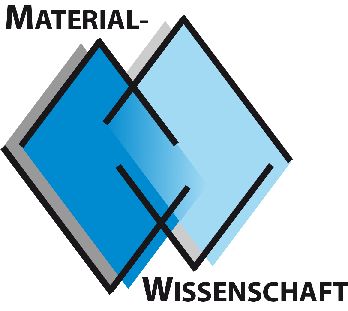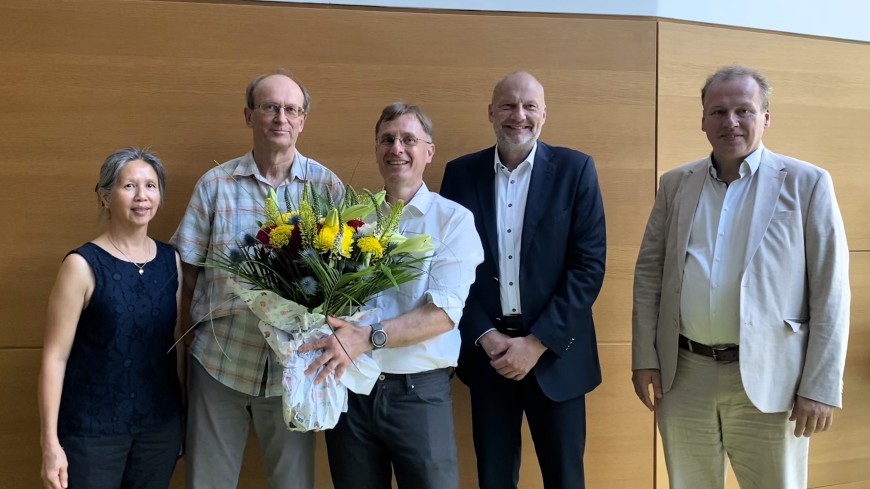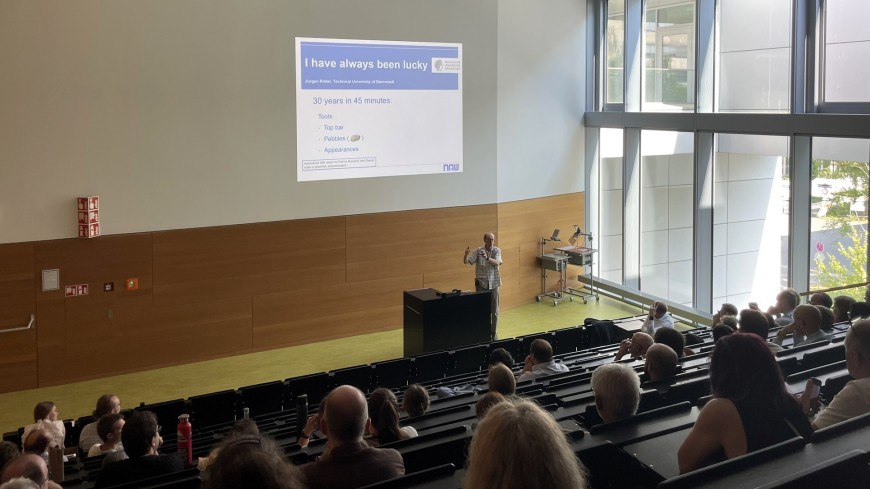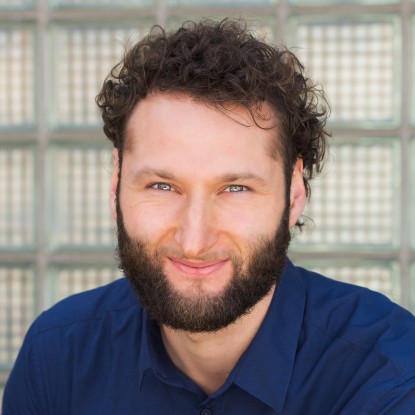I have always been lucky.
TU Darmstadt and the Institute of Materials Science bid farewell to Prof Jürgen Rödel
2024/07/09 by Ruben Bischler
60 doctoral students, 13 postdocs, six habilitation candidates, more than 100 students who have completed their theses under his supervision, 18 guest researchers with Alexander von Humboldt scholarships and many more. Jürgen Rödel's 30 years as a professor at TU Darmstadt could also be summarised by his immense international significance for an entire field of research, the many high-profile positions he has held and, of course, the prestigious prizes he has been awarded. In his final lecture on 27 June 2024, however, it became clear that the most important characteristic of Rödel and his career is something that prize money and impact factors cannot quantify: his ability to bring people together and promote talent.
Jürgen Rödel helped to establish materials science in Germany and made research into ceramic materials known worldwide.
Prof Karsten Durst (Dean of the Dept. Materials- and Geosciences)
Nevertheless, the countable milestones in the career of researcher Jürgen Rödel were of course honoured, too. In his introductory speech, Prof Karsten Durst, Dean of the Department of Materials- and Geosciences, emphasised Rödel's award of the Gottfried Wilhelm Leibniz Prize from the German Research Foundation (Deutsche Forschungsgemeinschaft, DFG), often referred to as the German Nobel Prize. He received this in 2009 for his achievements in the development of lead-free piezoceramics. Durst also referred to the Collaborative Research Centre 595, which Rödel recruited for the department in 2003 and headed as spokesperson. The large-scale project, which focussed on research into electrical fatigue in functional ceramics, was the first of its kind at the still young department and was funded by the DFG for twelve years.
Jürgen Rödel had a major impact on the development of the Technical University Darmstadt.
Prof Matthias Oechsner (Vice President for Research at TU Darmstadt)
Prof Matthias Oechsner, Vice President for Research at TU Darmstadt and a materials scientist himself, followed on from the previous speaker with impressive figures in his welcoming address: Rödel's 393 publications, which together have been cited almost 35000 times, were not only a lot, but above all of very high quality. This earned the “very capable and enthusiastic scientist” 7th place in the list of the world's most cited researchers in the field of functional ceramics.
Oechsner then turned the spotlight on Rödel's role for TU Darmstadt. Rödel was an active member of TU Darmstadt's Science Council (“Wissenschaftsrat”) from 2011 to 2024. The committee advises the Presidential Board on strategic issues relating to the direction of research activities. Rödel interrupted this mandate from 2014 to 2017 to take up the position of Vice President for Research. From 2019 to 2024, Rödel was a DFG liaison lecturer at TU Darmstadt. In these and many other voluntary activities, including outside TU Darmstadt, Rödel has passed on his knowledge and experience from many decades of cutting-edge research so that others can benefit from it. Rödel later said: “I know how to write proposals, but above all I know how not to write them.” The Vice-President concluded: “What a great career and what an enormous influence not only on scientific progress, but also on scientific institutions, academies and funding organisations – not least on TU Darmstadt.”
A talent scout, a team builder and a big supporter.
Prof Karsten Albe
The laudator, Prof Karsten Albe, Rödel's colleague of many years and his self-titled successor as the “tribal elder” at the Institute of Materials Science, then emphasised Rödel's outstanding human strengths once again. Rödel is well known for bringing people together, exchanging ideas and developing them further. He always encourages his colleagues to take a close look at things and question how they really work. Albe characterised Rödel as a “talent scout, a team builder and a great supporter” and also pointed out that Rödel is a role model in the important field of science communication. At the end of his speech, Albe recited a poem he had written for and about Rödel, entitled “Der Bleifreie” (The Lead-free).
Against the better knowledge of my dad, I associated with very intelligent people.
Prof Jürgen Rödel
Finally, Rödel was invited to the lectern – officially for the last time. He summarised his career, in which he constantly reinvented himself within the research field of functional ceramics. He divided his scientific activities into the four phases “Sintering I”, “Lead-free piezoceramics”, “Dislocations in ceramics” and “Sintering II (light-based sintering)” – not to be separated from one another stringently. Rödel has achieved outstanding results in all of these areas. In his well-known matter-of-fact manner, he said: “We simply built our own equipment and were thus able to carry out experiments that no one else in the world could.” With regard to his work on the mechanical behaviour of materials, he added dryly: “We often broke stuff.” However, he emphasised that the cornerstones of his career were and are his encounters with people. The title of his final lecture is also to be understood against this background: “I've always been lucky.” However, Rödel revealed with a wink that he had to fight hard for these encounters, at least at the beginning of his career: “I associated with very intelligent people, against the better knowledge of my father.”
My biggest concern is the fact that humanity has already crossed six planetary boundaries.
Prof Jürgen Rödel
Rödel also gave an outlook on what he will be doing from now on. In his private life, he wants to devote himself to his hobbies of hiking and cycling. However, he does not yet consider his scientific work to be complete. Here, he wants to concentrate fully on the things that also occupy him in his private life: The sustainability crisis, which, as he pointed out, goes far beyond the climate crisis, but also includes aspects such as the integrity of the biosphere, ocean acidification or drinking water availability. In the recent past, Rödel has emphasised the urgency of sustainable action in many presentations. In particular, he urged the research communities to communicate their respective knowledge about the crises and possible solutions loudly and relentlessly, but also to set a good example themselves – for example in the form of sustainable laboratory operations or sustainably organised conferences. With this in mind, Rödel founded the International Alliance of Societies for a Sustainable Future (SFS) at the beginning of the year. He will now use the reputation he has built up over the past decades to expand the alliance.
It is already clear that the work of the internationally renowned materials scientist will have a lasting impact. Through his research results, his role model function, and most importantly for Rödel, through his protégés – more than twenty of whom meanwhile hold professorships themselves all over the world.
About the person:
Jürgen Rödel studied Werkstoffwissenschaften (materials science and engineering) in Erlangen and Leeds, obtained his doctorate at the University of California in Berkeley in 1988 and habilitated at the TU Hamburg-Harburg in 1992. Rödel was appointed to the TU Darmstadt in 1993 and took up the position in 1994. As only the sixth professor at the Institute of Materials Science, he played a decisive role in its establishment and continues to shape its direction to this day. Rödel is one of the leading international minds in ceramics research. The renowned solid-state chemist Prof Wolfram Jägermann once described him as “an exclamation mark of materials science”.




